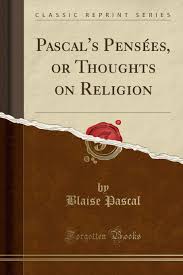Pensées Page #6
The Pensées is a collection of fragments on theology and philosophy written by 17th-century philosopher and mathematician Blaise Pascal. Pascal's religious conversion led him into a life of asceticism, and the Pensées was in many ways his life's work. The Pensées represented Pascal's defense of the Christian religion.
And men of intuition who are only intuitive cannot have the patience to reach to first principles of things speculative and conceptual, which they have never seen in the world, and which are altogether out of the common. 2 There are different kinds of right understanding;[2] some have right understanding in a certain order of things, and not in others, where they go astray. Some draw conclusions well from a few premises, and this displays an acute judgment. Others draw conclusions well where there are many premises. For example, the former easily learn hydrostatics, where the premises are few, but the conclusions are so fine that only the greatest acuteness can reach them. And in spite of that these persons would perhaps not be great mathematicians, because mathematics contain a great number of premises, and there is perhaps a kind of intellect that can search with ease a few premises to the bottom, and cannot in the least penetrate those matters in which there are many premises. There are then two kinds of intellect: the one able to penetrate acutely and deeply into the conclusions of given premises, and this is the precise intellect; the other able to comprehend a great number of premises without confusing them, and this is the mathematical intellect. The one has force and exactness, the other comprehension. Now the one quality can exist without the other; the intellect can be strong and narrow, and can also be comprehensive and weak. 3 Those who are accustomed to judge by feeling do not understand the process of reasoning, for they would understand at first sight, and are not used to seek for principles. And others, on the contrary, who are accustomed to reason from principles, do not at all understand matters of feeling, seeking principles, and being unable to see at a glance. 4 Mathematics, intuition.--True eloquence makes light of eloquence, true morality makes light of morality; that is to say, the morality of the judgment, which has no rules, makes light of the morality of the intellect. For it is to judgment that perception belongs, as science belongs to intellect. Intuition is the part of judgment, mathematics of intellect. To make light of philosophy is to be a true philosopher. 5 Those who judge of a work by rule[3] are in regard to others as those who have a watch are in regard to others. One says, "It is two hours ago"; the other says, "It is only three-quarters of an hour." I look at my watch, and say to the one, "You are weary," and to the other, "Time gallops with you"; for it is only an hour and a half ago, and I laugh at those who tell me that time goes slowly with me, and that I judge by imagination. They do not know that I judge by my watch.[4] 6 Just as we harm the understanding, we harm the feelings also. The understanding and the feelings are moulded by intercourse; the understanding and feelings are corrupted by intercourse. Thus good or bad society improves or corrupts them. It is, then, all-important to know how to choose in order to improve and not to corrupt them; and we cannot make this choice, if they be not already improved and not corrupted. Thus a circle is formed, and those are fortunate who escape it. 7 The greater intellect one has, the more originality one finds in men. Ordinary persons find no difference between men. 8 There are many people who listen to a sermon in the same way as they listen to vespers. 9 When we wish to correct with advantage, and to show another that he errs, we must notice from what side he views the matter, for on that side it is usually true, and admit that truth to him, but reveal to him the side on which it is false. He is satisfied with that, for he sees that he was not mistaken, and that he only failed to see all sides. Now, no one is offended at not seeing everything; but one does not like to be mistaken, and that perhaps arises from the fact that man naturally cannot see everything, and that naturally he cannot err in the side he looks at, since the perceptions of our senses are always true. 10 People are generally better persuaded by the reasons which they have themselves discovered than by those which have come into the mind of others. 11 All great amusements are dangerous to the Christian life; but among all those which the world has invented there is none more to be feared than the theatre. It is a representation of the passions so natural and so delicate that it excites them and gives birth to them in our hearts, and, above all, to that of love, principally when it is represented as very chaste and virtuous. For the more innocent it appears to innocent souls, the more they are likely to be touched by it. Its violence pleases our self-love, which immediately forms a desire to produce the same effects which are seen so well represented; and, at the same time, we make ourselves a conscience founded on the propriety of the feelings which we see there, by which the fear of pure souls is removed, since they imagine that it cannot hurt their purity to love with a love which seems to them so reasonable. So we depart from the theatre with our heart so filled with all the beauty and tenderness of love, the soul and the mind so persuaded of its innocence, that we are quite ready to receive its first impressions, or rather to seek an opportunity of awakening them in the heart of another, in order that we may receive the same pleasures and the same sacrifices which we have seen so well represented in the theatre. 12 Scaramouch,[5] who only thinks of one thing. The doctor,[6] who speaks for a quarter of an hour after he has said everything, so full is he of the desire of talking. 13 One likes to see the error, the passion of Cleobuline,[7] because she is unconscious of it. She would be displeasing, if she were not deceived. 14 When a natural discourse paints a passion or an effect, one feels within oneself the truth of what one reads, which was there before, although one did not know it. Hence one is inclined to love him who makes us feel it, for he has not shown us his own riches, but ours. And thus this benefit renders him pleasing to us, besides that such community of intellect as we have with him necessarily inclines the heart to love. 15 Eloquence, which persuades by sweetness, not by authority; as a tyrant, not as a king. 16 Eloquence is an art of saying things in such a way--(1) that those to whom we speak may listen to them without pain and with pleasure; (2) that they feel themselves interested, so that self-love leads them more willingly to reflection upon it. It consists, then, in a correspondence which we seek to establish between the head and the heart of those to whom we speak on the one hand, and, on the other, between the thoughts and the expressions which we employ. This assumes that we have studied well the heart of man so as to know all its powers, and then to find the just proportions of the discourse which we wish to adapt to them. We must put ourselves in the place of those who are to hear us, and make trial on our own heart of the turn which we give to our discourse in order to see whether one is made for the other, and whether we can assure ourselves that the hearer will be, as it were, forced to surrender. We ought to restrict ourselves, so far as possible, to the simple and natural, and not to magnify that which is little, or belittle that which is great. It is not enough that a thing be beautiful; it must be suitable to the subject, and there must be in it nothing of excess or defect.
Translation
Translate and read this book in other languages:
Select another language:
- - Select -
- 简体中文 (Chinese - Simplified)
- 繁體中文 (Chinese - Traditional)
- Español (Spanish)
- Esperanto (Esperanto)
- 日本語 (Japanese)
- Português (Portuguese)
- Deutsch (German)
- العربية (Arabic)
- Français (French)
- Русский (Russian)
- ಕನ್ನಡ (Kannada)
- 한국어 (Korean)
- עברית (Hebrew)
- Gaeilge (Irish)
- Українська (Ukrainian)
- اردو (Urdu)
- Magyar (Hungarian)
- मानक हिन्दी (Hindi)
- Indonesia (Indonesian)
- Italiano (Italian)
- தமிழ் (Tamil)
- Türkçe (Turkish)
- తెలుగు (Telugu)
- ภาษาไทย (Thai)
- Tiếng Việt (Vietnamese)
- Čeština (Czech)
- Polski (Polish)
- Bahasa Indonesia (Indonesian)
- Românește (Romanian)
- Nederlands (Dutch)
- Ελληνικά (Greek)
- Latinum (Latin)
- Svenska (Swedish)
- Dansk (Danish)
- Suomi (Finnish)
- فارسی (Persian)
- ייִדיש (Yiddish)
- հայերեն (Armenian)
- Norsk (Norwegian)
- English (English)
Citation
Use the citation below to add this book to your bibliography:
Style:MLAChicagoAPA
"Pensées Books." Literature.com. STANDS4 LLC, 2024. Web. 25 Nov. 2024. <https://www.literature.com/book/pens%C3%A9es_114>.




Discuss this Pensées book with the community:
Report Comment
We're doing our best to make sure our content is useful, accurate and safe.
If by any chance you spot an inappropriate comment while navigating through our website please use this form to let us know, and we'll take care of it shortly.
Attachment
You need to be logged in to favorite.
Log In